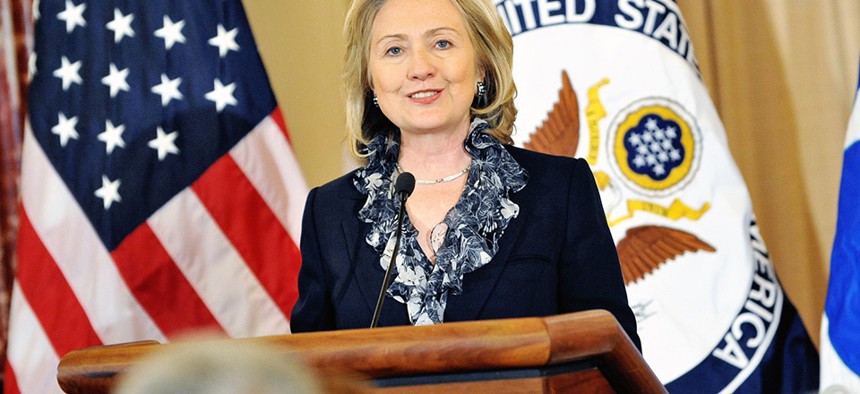
Clinton speaks in 2011 at a State Department event. State Department file photo
Clinton Mum on Email Controversy, Hits Republicans Instead
The soon-to-be presidential candidate stayed on message in her Tuesday night address at an EMILY's List event.
Tuesday night was Hillary Clinton's party, and no amount of bad publicity was going to get in the way.
Outside of the EMILY's List 30th anniversary celebration Tuesday, Washington was ablaze over the disclosure that Clinton had conducted her work via a personal email address while serving as secretary of state. Critics pounced, the White House and State Department were forced to talk about it, and Clinton's allies spent the day attempting to undermine the report. But inside the event, Clinton made no mention of the controversy—which began Monday night following a story in The New York Times about her email practices—and neither did anyone else.
Instead, the EMILY's List event had the feel of a campaign rally, with nearly every speaker referring to Clinton as the next U.S. president and repeatedly getting standing ovations for it. And when it came time to keynote the evening, Clinton herself hinted at a run: "And I suppose it's only fair to say, 'Don't you someday want to see a woman president?'" she asked the crowd, which responded with a standing ovation and raucous applause.
Instead of a defense, Clinton reiterated a message that felt decidedly like a campaign stump speech, focusing on economic fairness and women's empowerment—and even calling out Republicans for "trickle-down economics."
"If we want to find our balance again, we are going to have to work together to build that 21st-century economy, creating more and better jobs with higher wages that will make it possible to afford a middle-class life," she said, naming education, helping small businesses, and "making Washington work again" as steps toward that goal. She also praised collective-bargaining rights and denounced the fact that "CEO pay goes up and up" while workers struggle.
She also had some criticism for the GOP, declaring that Republicans are trying to "sing out of the same hymnal" as Democrats on issues like income inequality. "We're not buying that old trickle-down economics that didn't work before and will never work again, because it defies arithmetic and reality," she said. "So we welcome them to come with their ideas and we will match them."
Clinton closed with a rallying cry: "Let's go forth and win some elections!"
The speech capped an evening of praise for Clinton. Maryland Sen. Barbara Mikulski, one of EMILY's List's original candidates (and who announced her retirement on Monday) said the country will elect a female president in 2016—"and you know who I'm talking about," she said. The picture on the big screens next to the stage showed Clinton sitting in the front.
EMILY's List, the group that supports pro-choice women candidates for office, has long been advocating for Clinton: It went to bat for her during the 2008 campaign, announcing its endorsement the day she launched an exploratory committee, and is expected to be equally enthusiastic in 2016. The group's founder, Ellen Malcolm, served as a campaign co-chair in 2008.
"Just give the word and we'll be right at your side," Malcolm told Clinton Tuesday night, as she was seated at the front of the room throughout the program. "We're ready to fight and we're ready to win in 2016."
The group launched its "Madam President" initiative back in spring 2013, which was geared toward electing a female president in 2016. It included polling on the idea of a female president and mentioned other women pols' names, but was ostensibly intended to be about Clinton.
EMILY's List President Stephanie Schriock has stepped down from her position on the board of the pro-Clinton super PAC Priorities USA so she's able to aid Clinton directly from her current position. Denise Feriozzi, EMILY's List's political director, is taking her spot on the Priorities board.
Back outside the event, some Democrats are already expressing worries that the email story is more damaging than Clinton's aides are willing to admit.
The story "feeds into a narrative that [the Clintons] are willing to cut corners in order to try and protect her reputation," said one veteran Democrat. "It's going to sustain hundreds of thousands of dollars of ads from here on out."
Norm Sterzenbach, a longtime Democratic strategist in Iowa, said the email issue contributes to the existing narrative about the Clintons—but that voters really couldn't care less. "One of the challenges that Hillary Clinton has is that there's always something, there's always politics, there's always positioning yourself, and this sort of feeds into that," he said. "However … this is really a Washington narrative, and not anything that's going to have an impact out in the rest of the country."
Still, the constellation of pro-Clinton outside groups, along with other Clinton allies, spent all of Tuesday vocally defending the former secretary of state and reiterating that she did nothing wrong.
Correct the Record, the arm of American Bridge that has worked as a rapid-response operation on Clinton's behalf, quickly sent around a memo including expanded comments from Clinton spokesman Nick Merrill and the State Department. The group noted that fellow former Secretary of State Colin Powell also used a personal email address and that Clinton has already turned over 55,000 pages of emails. And Media Matters for America, the David Brock-run group, immediately went after the Timesstory's "deceptive suggestion that Hillary Clinton may have violated federal records law" and continued to criticize the story in missives mailed to reporters throughout the day.
Other Democrats supporting Clinton's campaigns also insisted the story won't have any sort of lasting impact on the would-be candidate as she prepares her campaign. "[Clinton] is both famous and well-known; people have had a long time to get to know her," Democratic strategist Chris Lehane wrote in an email. "In short, at this point, she is already considered by voters as a candidate in full and, as a result, a story like this one is viewed through such a prism of familiarity by voters."
Bob Shrum, a longtime Democratic strategist, said scandals and the Clintons are old news, and that Republicans who use such scandals to go after Bill and Hillary Clinton have never stuck.
"That narrative started … in 1994 with a phony scandal called Whitewater. It's never gotten [Republicans] anywhere, but they keep doing it and doing it and doing it," Shrum said. The story may have dominated the last 24 hours, he added, but "24 days from now, it will just be fodder for Fox News."







